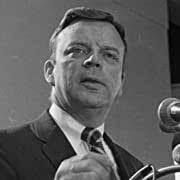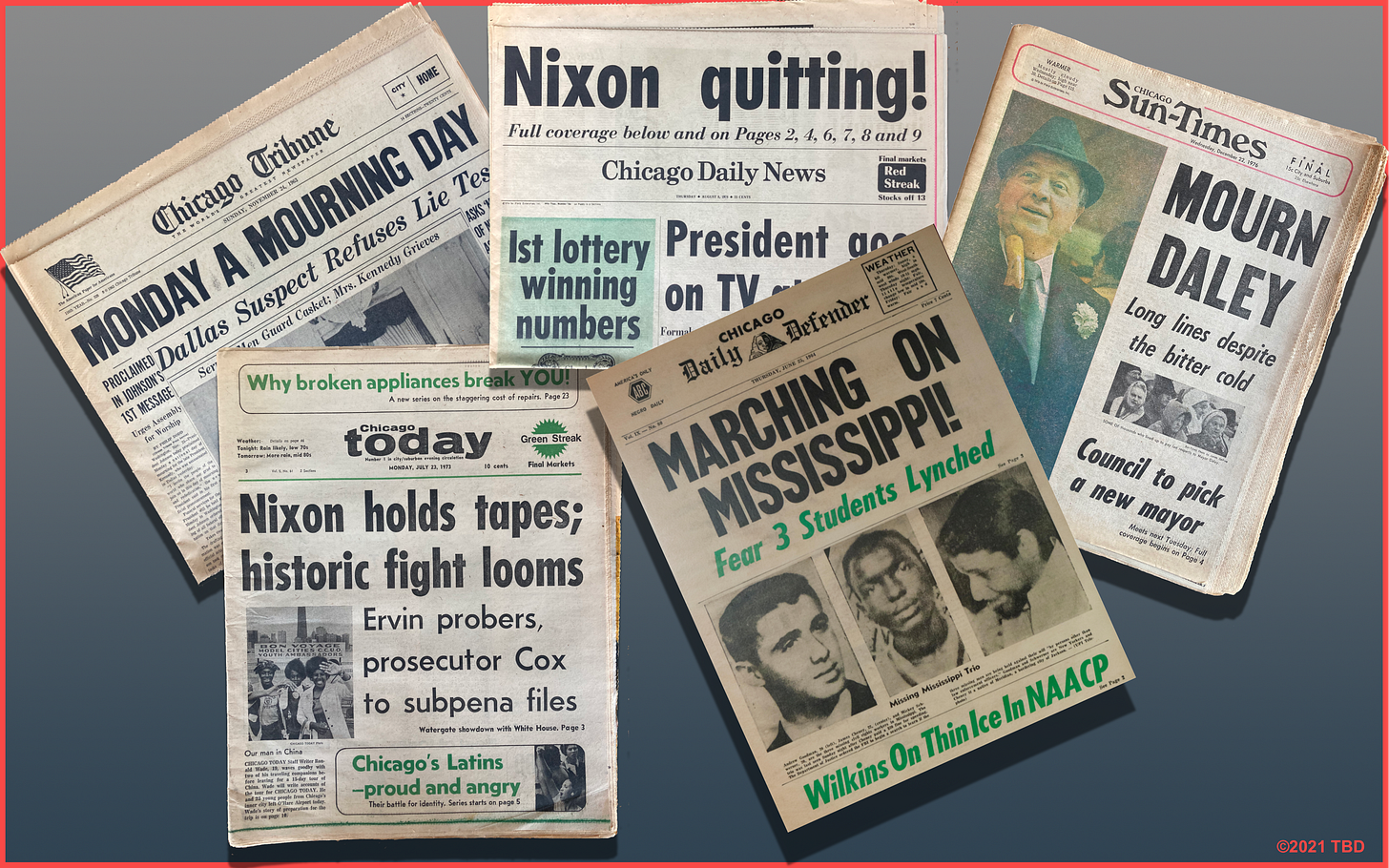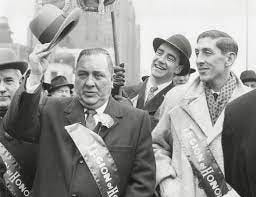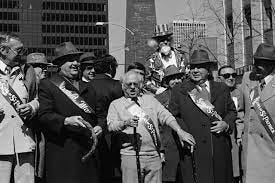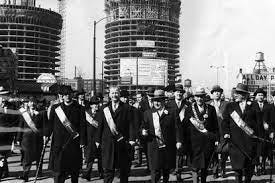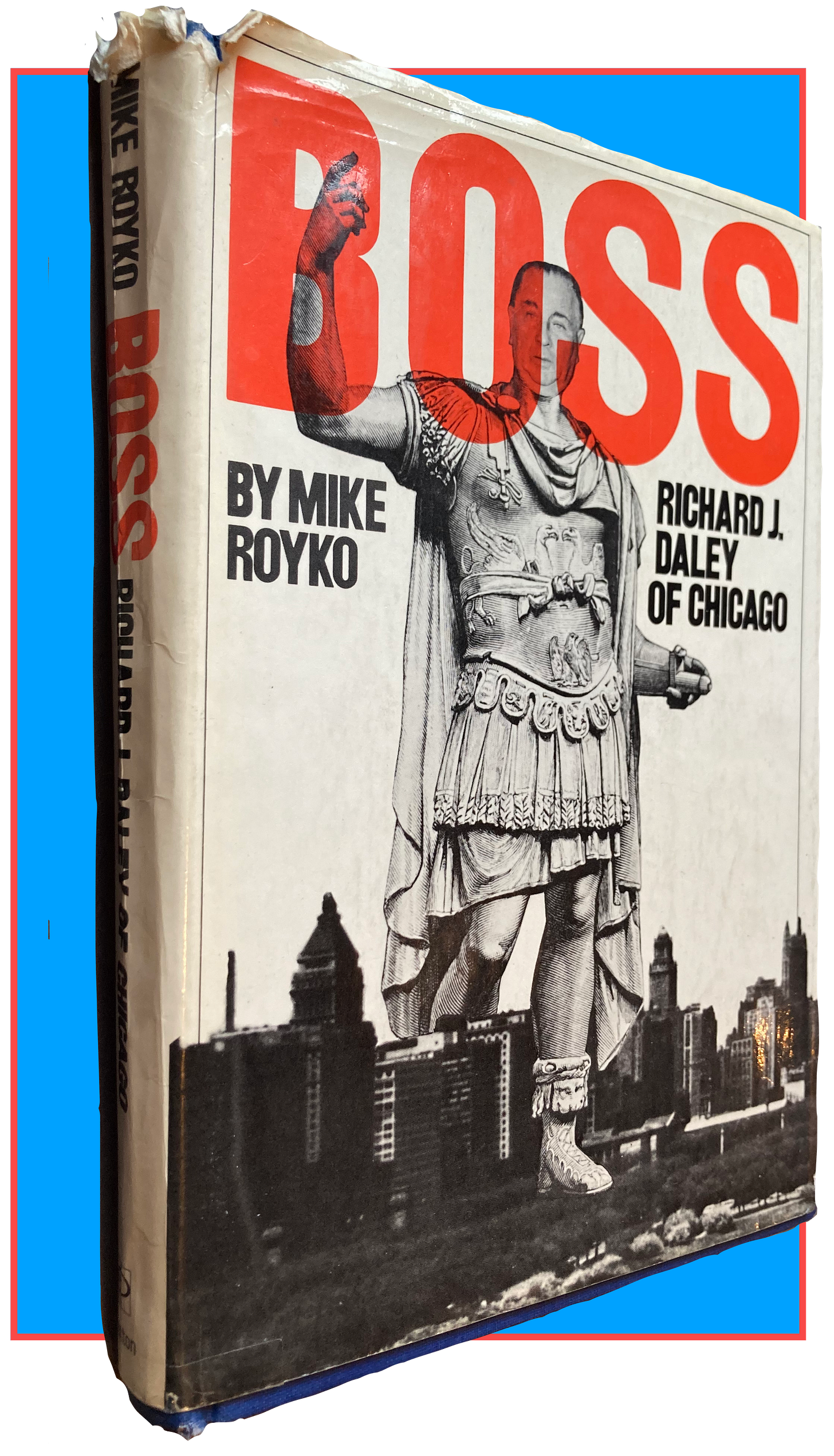Mike Royko 50 Years Ago Today: Mike may move to Lake Forest and get his neighbor's eyes poked out by the village board.
Weekly Compilation March 13-19, 1972
To access other parts of this site, click here for the Home Page.
Why do we run this separate item, Mike Royko 50 Years Ago Today? Because Steve Bertolucci, the hero of the serialized novel central to this Substack, “Roseland, Chicago: 1972,” lived in a Daily News household. The Bertolucci’s subscribed to the Daily News, and back then everybody read the paper, even kids. And if you read the Daily News, you read Mike Royko. Read the daily Royko briefing Monday-Friday on Twitter, @RoselandChi1972.
March 13, 1972
Hanrahan: happy warrior
Indicted Cook County State’s Attorney Ed Hanrahan left last night’s TV debate with primary opponent Donald Page Moore, an independent Democrat, laughing and joking around.
Hanrahan even threw “an characteristically mild insult at his least-favorite columnist” as he walked off stage, and we all know who that is.
Hanrahan has never been the happy-go-lucky politician before, writes Mike.
“Three years ago, when we were on an unimportant TV show together, he hung around afterwards, quarreling about a minor point of law, petulantly complaining about his press coverage, and finally stalking away with his jaw muscles twitching.”
And that was before Hanrahan’s police raided a Black Panther apartment in pre-dawn hours and killed Fred Hampton and Mark Clark in 1969. Now Hanrahan is indicted for conspiracy to obstruct the investigation into the raid. And Mayor Daley dumped him from the Machine slate of candidates for this primary, replacing Hanrahan with Traffic Court Judge Raymond Berg.
People thought Hanrahan was nuts not to quietly accept it, knowing the Machine would make him a judge if he beat the Panther case. But, says Mike, “He didn’t go into politics because he wanted to be a judge. Any loyal party hack who squeaks through law school can aspire to a black robe.”
Hanrahan always wanted more, writes Mike, and if he wins this primary and election, “He will have demonstrated his strength where it counts--at the polls--and will be able to thumb his nose at the party bosses.”
If Daley doesn’t run for another term in 1975, “Hanrahan would be first in line for the job”.
“That’s why Hanrahan is so cheerful these days,” Mike explains. “He’s like a high-roller who has thrown all of his chips into the one, last, biggest pot of the game.
“If he loses, what has he lost? A judgeship, which wouldn’t appeal to him anyway, since it is not proper for a judge to hit defendants on the head with his gavel.
“But if he wins? Boss II.”
March 14, 1972
The lullaby of Bridgeport
Last week, Mike wrote about Raymond Berg saying he could beat his fellow primary candidates for State’s Attorney in a boxing match.
Now, Mike reports, Berg “has related a remarkable anecdote from his childhood to a group of precinct captains, so they would appreciate the depths of his party loyalty.”
Berg told the precinct captains that his father told him, as a young boy: “Nobody will look after you and care for you except the Democratic Party.”
Recall that Berg was until recently a Traffic Court Judge. His pal Mayor Daley made him the Machine’s candidate for State’s Attorney after dumping indicted incumbent Ed Hanrahan, soon to be on trial for allegedly obstructing the investigation of his office’s pre-dawn police raid in 1969 that killed Black Panthers Fred Hampton and Mark Clark.
Mike notes that “Most children, if told their futures would be in the hands of such foster-daddies as Parky Cullerton, John D’Arco and Coroner Toman, would be using rubber sheets until they were 18.”
“That’s because I knew something about Chicago politics when I was a boy,” writes Mike. He listened to neighbors sitting on their porches. “Sometimes they would analyze Max, the precinct captain, whose diamond ring was the envy of the neighborhood ladies.”
“Usually they said something like: ‘Hey, here comes Max. He’s the biggest crook in the neighborhood.’”
Others argued that the alderman was a bigger crook. No, the ward committeeman was an even bigger crook. Eventually, somebody would say Mayor Ed Kelly “must be the biggest crook in town”. But even then, Pat Nash, who ran the Democratic party, was called a bigger crook than Kelly.
“After hearing enough of this kind of political analysis, a child who thought he was going to be adopted by the Kelly-Nash Machine would probably prefer being handed over to the Wicked Witch of the West.”
March 15, 1972
Lake Forest has a crisis
Even Lake Forest has problems “in these troubled times,” Mike advises. “Sometimes one of the country clubs has a shortage of caddies. Or rain will fall during a lawn party, soaking the finger sandwiches.”
Now, a Lake Forest couple wants to sell their mansion and estate to a group that wants to convert it into a home for retarded children.
“But to convert the sprawling estate to a new use, a zoning variation was needed, and Lake Forest is very strict about zoning,” writes Mike. “It would rather not have anything added that will make it look much different than it did in the 1890’s. In election years, they even prefer that residents use Teddy Roosevelt stickers.”
Lake Foresters united against the project. “Some people said the presence of the retarded children would shrink the value of their own property….Others said the children’s home would have a detrimental effect on their ‘life style.’”
The village board listened to experts who swatted down all the fears. The board voted to deny the zoning change. “And their logic for doing so sounded like something right out of Catch-22,” writes Mike.
FYR: “Catch-22” by Joseph Heller is the best novel of the 20th century. The 1970 movie directed by Mike Nichols and starring the incomparable Alan Arkin as Yossarian is fantastic, even though the TV Guide always gave it two stars. Two stars?! My God, Paula Prentiss, Bob Newhart, Buck Henry! Stop reading and go watch it for the opening titles alone. Back to Lake Forest in progress.
“The board…reasoned that while the fears of the Lake Forest citizens had no real basis, the fear itself was genuine. Therefore, their irrational fears deprived these residents of ‘full enjoyment’ of their own property.”
Mike says he has a neighbor with a strange look in his eye.
“I can’t shake the feeling that he intends to slit my throat some night….Maybe I’ll move to Lake Forest. Then if I have neighbors with those kind of eyes, I’ll ask the village board to poke them out. Why shouldn’t I have the full enjoyment of my property?”
Don’t forget to check out Chapter 3 Notes: Chicago Newspapers Circa 1972.
“Simply wonderful! A must-read!” —Carol Marin
March 16, 1972
Announcing: Dear Mike
Someone recently wrote to Daily News financial advice columnist Charles Elia, asking how to hide assets in order to get into public housing.
Elia wouldn't answer. “You’re going to have to lie to get what you want,” he noted.
Mike’s take: Elia’s reply “illustrates one of the great injustices of our society. All up and down La Salle St., you can find experts and specialists who will provide sound, reliable advice on how to cheat at almost anything.
“However, their services come high. The average person can’t afford them….Thus he is deprived of good, sound advice on how to cheat.
“Where would this city be if our leading wealthy, powerful and respected citizens could not call upon wise counselors when they had a hot deal in mind? We would never have had any leading wealthy, powerful and respected citizens, that’s where. They would have all been caught.”
“One reason our prisons are filled with stickupmen, burglars, head-breakers, car thieves and other crude criminals is that these men lacked opportunity. If they had the right advice and training, they could steal and cheat without resorting to violence, and they would reduce their chances of getting caught.
“Our crime rates would drop and our streets would be safer….Our prisons wouldn’t be nearly as crowded.”
“Because the man who knows how to steal with the pen and contract or the discreet fix does much better financially than the lout who uses a gun, we would have greater prosperity throughout the land.”
Mike will answer similar questions in future columns, because “I have always believed that the average guy wants to get ahead in life, and he knows what he needs. He just isn’t sure how to steal it.”
March 17, 1972
They reign in their parade
Time for the St. Patrick’s Day parade!
“Although it is an Irish observance, people of all ethnic and racial backgrounds take part because, as Mayor Daley is fond of saying, ‘Everybody in Chicago is Irish on St. Patrick’s Day,” writes Mike.
The river is dyed green, restaurants serve corned beef and cabbage, and of those who don’t take part, “the mayor’s friends jokingly boast: ‘There are only two kinds of people--those who are Irish, and those who wish they were Irish.’”
“Of course, this isn’t the only such annual observation in Chicago,” writes Mike. There’s the Puerto Rican San Juan Bautista day in June, Martin Luther King’s birthday, Hanukkah, and so on. The whole city celebrates appropriately--eating roast pig or soul food, marching down State Street in Puerto Rican “pava” hats or African dashikis.
Mayor Daley adjusts his saying for these other holidays--“During Hanukkah, everybody in Chicago is a Jew,” for instance.
Mike’s closer: “When you think about it, these special days, which every ethnic group has, are one of the reasons the people of Chicago get along so well together.”
March 18-19, 1972
As we here all know, weekends could be sad for a Daily News family because Mike Royko wasn’t in the Daily News’ single weekend edition. So we look for Mike elsewhere on weekends.
I love to read Mike Royko articles outside his columns, either by or about Mike. We all get the occasional pleasure of reading a Mike column we missed entirely, or had largely forgotten. But these outside articles are truly found treasures that we can all scoop up and appreciate as wholly new. I’ve already collected a few examples by Mike in other venues to share with you in the weeks ahead.
Here’s an article about Mike which I’m hunting for— “Columnist Mike Royko: Chicago’s Tough Guy” from the June 1981 Washington Journalism Review (later renamed the American Journalism Review, now defunct). I’m still feeling my way around Facebook, and just this week discovered the Facebook group “Mike Royko Is God.” What a great name. Someone there had posted the WJR June 1981 cover, which I discovered you can download online in high quality. The problem is finding the inside of the issue, even in physical form at a library, in print or microfiche. I’ll get it eventually. But if any reader has it, please send along and I’ll share it here. For that matter, if you have any articles outside the Chicago papers by or about Mike to share, please do.
Today, in lieu of “Chicago’s Tough Guy,” here are some excerpts from Joseph Epstein’s review of “Boss” in the September 1971 issue of Commentary.
There were many fine rave reviews of “Boss,” of course, and we’ll get to them eventually. It’s fun to read people praising Mike. But it’s more interesting to read a negative review of a book that you love, and that’s been considered a classic for decades. Many of my favorite books drew initially bad or blah reviews, and that includes the best novel of the 20th century, “Catch-22.” The points picked out as weaknesses inevitably are the literary bulwarks that make these books truly great. Sometimes, you can understand why not everyone appreciated those points initially. The fractured structure of “Catch-22” is confusing at first, but we now recognize that’s a good thing which adds to the story as a reflection of Yossarian’s traumatized psychological state. I think we do anyway, I never took a class on “Catch-22” or anything. I don’t have a Ph.D.
You won’t be shocked that Epstein, like other “Boss” critics, feels Royko didn’t give a well-rounded account of Mayor Daley—that he should have given Daley the benefit of the doubt sometimes, or excused views or actions due to Daley’s background and time. We all know that in a way, Epstein is right. And yet he’s also wrong.
“Boss” doesn’t attempt a truly personal or psychological portrait of Mayor Daley—true. We don’t get a lot about Mayor Daley as a husband and father. But Royko’s detailed description of Chicago in Daley’s youth and through 1971 describes Mayor Daley simultaneously. This is implicit throughout. Royko explains precisely where Daley came from and why he thinks the way he does, in simple punchy prose. Royko just doesn’t accept and excuse anything or anybody for not rising above that background. Since Royko comes from much the same background, a generation later, he has more of a right to criticize on that level, I always thought.
Should every biography take this approach? No, definitely not. There’s a limit to how much you can accomplish if you expect everybody to rise above their circumstances. But that doesn’t mean every biography must take the well-rounded, psychological portrait route. The power of “Boss” is exactly in its distillation of how Chicago and its political people worked, with no foam on top obscuring the view.
If “Boss” was the only book ever written about Mayor Daley, then it would not be enough. But it was never going to be the only book written about Mayor Daley. Even Robert Caro probably sees the value in shorter, more focused approaches in some biographies.
Epstein’s tone is unrelentingly condescending, except to Mayor Daley. Epstein is a big Mayor Daley fan. His message is basically the same as Father Andrew Greeley’s—they must have been pals. That alone is interesting, since today even most people who disagreed with Mike Royko recognize him as a journalistic giant, and won’t go much further than that. I enjoyed reading somebody who made me think again about what “Boss” is, what “Boss” is not, and whether that’s good or bad.
Joseph Epstein is, of course, a well known conservative writer of essays and fiction. He’s also a Chicagoan who graduated from Senn High School and got his bachelor’s degree from the University of Chicago. He edited The American Scholar 1975-1997, and lectured in literature and writing at Northwestern for nearly 30 years, until 2002. Apparently the poetry world will never get over Epstein’s 1988 essay in Commentary, “Who Killed Poetry?” I never read it myself. I like good poetry, but I can’t get too worried about it.
Right now, Epstein is best known for his Wall Street Journal op-ed asking Jill Biden to stop calling herself “Dr.” due to her Ph.D in education. Northwestern went to the trouble of issuing a statement disavowing the op-ed and declaring, “Northwestern is firmly committed to equity, diversity and inclusion, and strongly disagrees with Mr. Epstein’s misogynistic views.”
I didn’t read the Jill Biden piece when it ran in December 2020, but just checked to see if it’s as egregious as all that. Short answer if you don’t feel like reading it yourself: Not really. Epstein thinks it’s kind of pathetic when anybody with a Ph.D., who isn’t a medical physician, insists on being called “Doctor.” Most people I know agree with that, and I do. But Epstein had to be a jerk about it—addressing the whole thing to Jill Biden personally, and calling her “kiddo,” rather than just mentioning Biden as an example of people who want to make sure everybody knows how long they went to school. Between the Jill Biden op-ed and this review of “Boss,” I’m pretty sure Epstein is the kind of guy people want to punch even when they substantially agree with him.
I wonder if Epstein ever thought, even privately, that he’d like to revise this “Boss” review at all, and if so, how. I see from his Wikipedia entry that he slightly walked back his controversial 1970 Harper’s essay, "Homo/Hetero: The Struggle for Sexual Identity.”
Perhaps Mike Royko might have sometimes thought that he’d do this or that differently in “Boss.” But it’s good that Royko wrote in the time of physical printed words, and could not change “Boss,” because attempting to be more “fair” to Mayor Daley would have destroyed the hard-charging character of the book.
What Epstein and others were looking for in “Boss,” Royko saved for his eulogy to Daley in the Daily News immediately after the mayor’s death five years later:
Daley was a product of the neighborhoods and he reflected it in many good ways—loyalty to the family, neighbors, old buddies, the corner grocer. You do something for somebody, they do something for you. If somebody is sick, you offer the family help. If someone dies, you go to the wake and try to lend comfort. The young don’t lip off to the old, everybody cuts his grass, takes care of his property. And don’t play your TV too loud.
That’s the way he liked to live, and that’s what he thought most people wanted, and he was right.
….There are those who believed Daley could have risen beyond politics to statesmanship had he embraced the idealistic causes of the 1960s rather than obstructing them. Had he used his unique power to lead us toward brotherhood and understanding, they say, he would have achieved greatness.
Sure he would have. But to have expected that response from Daley was as realistic as asking Cragin, Bridgeport, Marquette Park or any other Chicago neighborhood to celebrate Brotherhood Week by having Jeff Fort to dinner. If Daley was reactionary and stubborn, he was in perfect harmony with his town.”
Well I meant to just type out some excerpts, and look what happened.
Without further ado, from Joseph Epstein’s 1971 review of “Boss”:
Until not too long ago, the general view of Chicago’s longtime mayor, Richard J. Daley, was of a New Dealish liberal, a man of fairly decent instincts, and in matters having to do with city government a figure of towering competence. But all this is past history now. Since the Democratic Convention of 1968, Daley’s reputation has slipped further and further, till today his portrait hangs high in the rogue’s gallery of the Left, florid cheek by flaccid jowl alongside those of J. Edgar Hoover and Bull Connor.
Boss, Mike Royko’s slender political biography, is a chronicle of Daley’s rise from humble origins to national villainy. Mr. Royko is a columnist for the Chicago Daily News, and as such is one of the city’s few journalistic ornaments. With the aid of a fine feel for the city of Chicago and a nice comic touch, over the years he has made it hot for the boys down at City Hall while simultaneously wringing more laughs out of the subject of municipal corruption than one would have thought possible. Here, however, Royko isn’t playing for laughs but for moral outrage against the way Richard J. Daley runs Chicago.
….Before sitting down to write his book, Mr. Royko evidently decided that the conventional wisdom that holds Richard J. Daley to be a flat-out s.o.b. was impeccable; and there remained only to supply the prose. The prose Royko has supplied is of a highly readable order, offering plenty of punchlines in a brisk narrative that refuses to be slowed down by the complexities of either character or event. Such is the uniform hostility of Boss to its subject that any attempt to understand Daley is precluded; the book is, quite simply, an unremitting hatchet job.
….Although he does not say so straight out, the underlying message of Royko’s book seems to be that Daley is effective because he is an essentially evil man who controls an evil machine operating in an evil system—and evil, whatever else it is, is efficient, or so Royko appears to believe. Thus Daley, rather like Mussolini, in Royko’s version, makes the trains run on time.
Here, I have to say it feels like Epstein is setting up a straw-man argument to knock down. I don’t think Mike portrayed Mayor Daley as evil, and if anything I think the message of “Boss” is precisely that Mayor Daley’s power came from understanding what his people and the Machine system wanted and required—that, as the saying from “The Godfather” goes, it’s just business, not personal.
In any case, Epstein’s counter thesis is that Daley is an effective mayor because he doesn’t want to be something bigger like governor or president—Daley likes things orderly, and “Daley is almost completely without political vision of any kind.” In making that argument, Epstein seems (to me) to be in complete agreement with the Daley presented in great detail in “Boss,” especially the part regarding Martin Luther King. Epstein goes on:
Daley does not entertain the very highest view of human nature; he believes, in fact, that most people will only do those things that they feel it is in their interest to do. He, Daley, puts up skyscrapers, lays down freeways, creates jobs, keeps commerce and traffic flowing, but he neither educates nor attempts to build character in the electorate. He is not so much a leader of people as he is a manipulator of different—often seemingly implacably opposed—interests. But interests, in order to gain a hearing from Daley, must be organized. In the middle 1960’s, for example, when the late Martin Luther King, Jr. determined to bring his campaign of moral suasion up north to Chicago, people with a surer sense of Daley than King’s tried to warn him against doing so. As the more political-minded of the civil-rights leaders knew, Daley would finally have only one question to ask of the King campaign in Chicago: How many votes has the Southern Christian Leadership Conference?
I’m going to skip a long section on Machine politics in general which also really just dovetails with Mike’s analysis, plus Epstein’s thoughts on Daley versus Lindsay, which are no longer of much interest. Resuming:
Daley….is a public-relations-man’s nightmare on television and something very close to a genius at maintaining control over the minutiae involved in keeping a city running.
….To Mike Royko, however, Daley is little more than a variety of thug—a superior thug, even the king of thugs, but a thug nonetheless. In describing Daley’s actions during the 1968 Democratic Convention in Chicago, for example, the case that Royko makes out against Daley is not that he overreacted, or made a foolish mistake, but rather that he shed his false skin to reveal, at long last, his essential self. Everyone who has followed Daley’s career over the years has his own pet theory about what happened in ’68. That he overreacted is beyond question; but I think one can go further to say that he became completely unstrung, that he even, quite possibly, flipped. For in failing to restrain his police force he committed, among other things, an unpardonably stupid political act. And whatever else one might wish to call Richard Daley, no one, so far as I know, has ever called him a politically stupid man.
….There is something touchingly naive about a man like Mike Royko, who normally prides himself on his toughmindedness, locating the responsibility for almost all that is wrong with the world in the office of the Mayor of the City of Chicago. Get rid of Daley, the argument implicit in his book runs, and the millennium is here. A sounder, more sophisticated, and (to my mind) healthier view was recently expressed by a neighbor of my father’s. A man in his seventies and a resident of Chicago for his entire life, he is an Irish Catholic, like Daley, against whom he voted this past spring for the first time in the five times that Daley has successfully run for Mayor. He credits Daley with great intelligence, and does not believe him personally corrupt; he does, however, feel that the Daley machine has been in power in the city longer than is good for anyone. He was aware that voting against Daley was a fairly empty gesture, but nevertheless he did it. “It’s time,” his reasoning went, “for a new set of thieves.”
Now, let’s all go reread “Boss.”
By the way, this feature is no substitute for reading Mike’s full columns. He’s best appreciated in the clear, concise, unbroken original version. Mike already trimmed the verbal fat, so he doesn’t need to be summarized Reader’s Digest-style, either. Our purpose here is to give you some good quotes from the original columns, but especially to give the historic and pop culture context that Mike’s original readers brought to his work. You can’t get the inside jokes if you don’t know the references. Plus, many columns didn’t make it into the collections, so unless you dive into microfilm, there are some columns covered here you will never read elsewhere. If you don’t own any of Mike’s books, maybe start with “One More Time,” a selection covering Mike’s entire career and including a foreword by Studs Terkel and commentaries by Lois Wille.
Do you dig spending some time in 1972? If you came to MIKE ROYKO 50 YEARS AGO TODAY from social media, you may not know it’s part of the book being serialized here, one chapter per month: “Roseland, Chicago: 1972.” It’s the story of Steve Bertolucci, 10-year-old Roselander in 1972, and what becomes of him. Check it out here.
To get the weekly compilation of MIKE ROYKO 50 YEARS AGO TODAY in your mailbox along with THIS CRAZY DAY IN 1972 and new chapters of the book, SUBSCRIBE FOR FREE!




